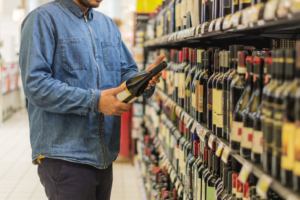Alcohol sales have surged since the COVID-19 pandemic began, raising concerns among USC experts and others that the bottoms-up binge could come with a social cost.
Alcoholic beverage sales rose by 55% in late March, when many states and public health officials urged residents to stay at home, compared to sales in 2019. While the increase in sales could represent stockpiling for the sheltered weeks ahead, it also signals the potential for alcohol abuse.
“With the social distancing restrictions of COVID-19, we’re seeing online [alcohol] sales increasing, an increase in demand and restaurants looking for ways to capitalize on the demand. It’s a perfect storm,” said Anthony Dukes, professor and chair of the marketing department at the USC Marshall School of Business.
To adapt to a marketplace transformed by pandemic, restaurants are offering alcohol as an option for takeout food orders — a first for California and some other states. It makes business sense because high-profit margins on wine and other alcoholic beverages are vital to restaurants and bars, Dukes said.
Wine tasting rooms, restaurants and bars are closed across California, the country’s biggest wine-producing state. The impact on Napa Valley vineyards and craft beer enterprises in San Diego extends beyond their patrons to the people they employ, the taxes they generate and the local tourism they support.
Support systems key to keeping addicts on the wagon
The closures do not mean that the booze stops flowing. Bars have capitalized by hosting chat rooms and online happy hours for their patrons. Friends and coworkers have launched virtual cocktail hours on Zoom, Instagram and other social media.
“As social distancing and self-isolation turns from weeks to months, we’ll see more online partying, more Zoom parties and more alcohol consumption, so we’re going to hear about more problems related to alcohol abuse,” said Daryl Davies, professor of clinical pharmacology at the USC School of Pharmacy and director of the Alcohol and Brain Research Laboratory at USC.
Economic dislocation, job loss and fear of death by disease are triggers for substance use, which heightens the risk of other issues like suicide and domestic violence, Davies said. Meanwhile, stay-at-home orders now in effect for COVID-19 limit access to support systems such as friends, neighbors, therapists, church, family and recovery groups.
“Connecting to support networks will be important so drinking doesn’t push people back into that dark space,” Davies said.
COVID-19 stress can lead to more alcohol, relapse
The combination of the pandemic, its economic fallout and stay-at-home mandates mean conditions are tailor-made for drinking.
“It’s stressful and boring. People are coping with kids at home, spouses, social stress, financial stress, work stress and the threat of disease. So, it doesn’t surprise me at all that we’ve seen a spike in drinking,” said John Clapp, professor at the USC Suzanne Dworak-Peck School of Social Work.
Clapp says he’s particularly concerned about the potential for relapse as people struggling to overcome substance use find themselves alone facing new challenges. He emphasized the need to recreate order in life through daily routines that help people cope during uncertainty. Simple measures like dressing business casual, shaving regularly and going to bed and waking up on schedule restore normalcy to life.
Abusing alcohol may increase risk of contracting COVID-19
People who misuse alcohol, drugs or tobacco face another risk: They could be more vulnerable to the virus.
“People who regularly smoke or use other substances can have impaired immune systems and lung functioning, which might increase risk of contracting COVID-19 and having worse outcomes from the virus,” said Adam Leventhal, professor of preventive medicine and psychology and director of the USC Health, Emotion and Addiction Laboratory at the Keck School of Medicine of USC.
He said that, historically, substance use has increased during regional disasters, like in the aftermath of Hurricane Katrina. Today’s pandemic amplifies stress amid job loss, illness, fear, isolation — all of which contribute to substance use.
But the good news is people who imbibe in social contexts can’t do so now due to social distancing, which could result in reductions in alcohol use for some, Leventhal said.
The USC experts urge people to manage their substance use, reach out to online support groups and take positive actions like yoga, gardening or exercise.
Said Clapp: “Just don’t drink like it’s going to be a never-ending weekend.”
